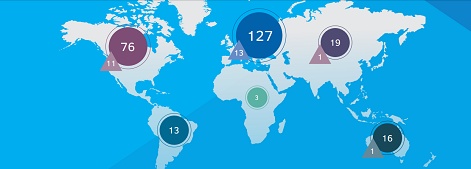We ask our industry panel - the brightest and sharpest VR professionals from around the world - one question about the VR industry, business, technology or trending stories every week.
Question: It was International Women’s Day last week, which got us thinking. We’re pleased to note that there are more women working in the VR industry now than we ever saw in conventional games development – PC, console or mobile. Why is that?
We now have a chance to shape the VR industry in the way that we want it to grow.Alyssia Frankland
Alyssia Frankland, VR Director at Breaking Fourth
“Following the new wave of VR development in the last couple of years, we have seen so many different industries exploring what they can do with this new technology. This versatility opens up the world of VR to many industries outside of videogames.
“Gaming has always been a very male-dominated industry and with VR taking hold in such industries such as film, education and healthcare, hopefully this industry will grow in a much more gender-balanced way.
“We now have a chance to shape the VR industry in the way that we want it to grow and alongside the many talented VR women who have already taken steps in exploring this new technology, I hope to see many more join the challenge of unleashing the potential of VR.”
This game isn’t gender specific like a pure technology play. It’s an exciting time for everyone.Caroline Stokes
Caroline Stokes, Executive Headhunter / Coach at FORWARD
“Last summer, I saw a prevalence in women working in VR and proved there was greater gender equity through research to understand talent trends and more recent survey results on women founders.
“VR requires talent from all entertainment and technologies and women are naturally gravitating towards it. The market is wide open right now. Solving VR challenges and finding the best solutions and experiences requires the best minds with different viewpoints and competencies to solve the challenges of this immersive entertainment. Talent from film, VFX, education, games, mobile, audio, storytelling, programming are all experimenting with this.
“Gender bias is less visible possibly due to the race to create innovative experiences and only the best adaptable minds will help win the race, which means this game isn’t gender specific like a pure technology play. It’s an exciting time for everyone.”
VR has much wider appeal to both sexes.Jonathan Wagstaff
Jonathan Wagstaff, Country Manager - UK & IE at CONTEXT
"In a recent global survey of 150 VR university labs conducted by VR First, it was found that on average 25% of students on courses were women. In terms of regional differences, France and Germany scored higher at >30% with the UK lagging behind at 16%.
“VR shares the same fate as technology as a whole in terms of gender preference, however VR has much wider appeal to both sexes than just gaming. VR film/TV content is being produced by both traditional and newer studios, which have a more representative demographic. The same is true for the growing educational/not-for-profit VR vertical. Although gaming is going in the right direction, it still has a long way to go until it reaches gender parity with the broader entertainment and usage categories of VR."

The onus should be on both men and women to grasp this opportunity of a new industry and to shape it into the environment we want it to be.Catherine Allen
Catherine Allen, VR producer and strategist
“Based on observation, several prominent industry figures have noted that there are more women in VR than in the conventional games industry. If this is reflected in the statistics, it’s clearly a good sign. The reasons why are likely because VR is a totally new medium; a fresh start, with fewer barriers to entry or limiting cultural assumptions.
“However, this fledgling industry should by no means pat itself on the back for this; there's a long way to go and we must continue working at it together until the industry reaches a stable 50/50 balance on all levels; from office assistant to CEO. We also need to address the gender balance of audiences. A survey commissioned by Wiggin LLP shows that while 20% of UK men have tried VR, only 13% of women have.
“I want to stress that gender diversity is a challenge for men to tackle jointly with women. I find it really frustrating when questions about gender balance are always directed at women. If I'm the only woman in the room, or at the panel, then that's often me. The onus should be on both men and women to grasp this opportunity of a new industry and to shape it into the environment we want it to be. We all know that gender diversity makes for healthier businesses, so let's make it so.”
VR is ‘born’ in a time of gender equality awareness.Faviana Vangelius
Faviana Vangelius, CEO and Co-Founder at SVRVIVE Studios
“I think it's partly because companies are more aware of the importance of having a truly diverse team, and partly because VR is one of the first industries to be ‘born’ in a time of gender equality awareness. But I also think the Women In Tech initiative - and similar events around the world - is another strong driving force.”

VR is taking a step in the right direction, but there’s still a long way to go.Dean Johnson
Dean Johnson, Head of Innovation at Brandwidth
“I could fill my response just listing the amazing women in tech/VR. Does VR appeal to women? Is it somehow better suited to them? I think it’s very difficult for me to answer without putting my virtual foot in it. Do women have a greater understanding of empathy in tech? Probably. Are they more emotionally aware? Yep.
“I think we should all sit up and listen to Cindy Gallup’s call to ‘change the ratio’. VR is taking a step in the right direction, but there’s still a long way to go."













